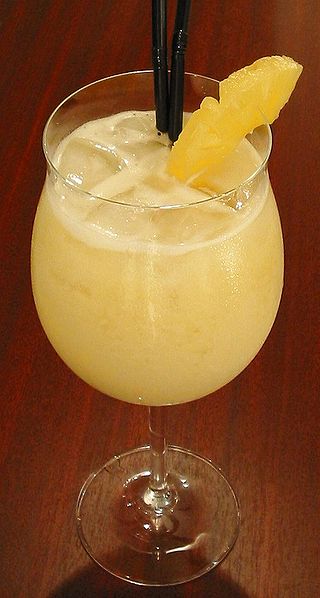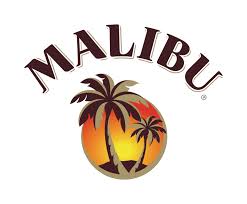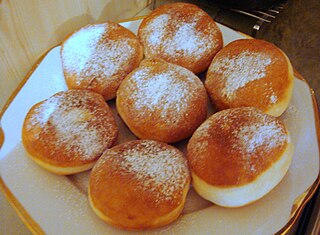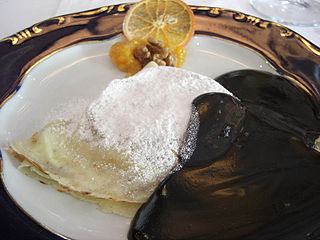
The piña colada is a cocktail made with rum, cream of coconut or coconut milk, and pineapple juice, usually served either blended or shaken with ice. It may be garnished with either a pineapple wedge, maraschino cherry, or both. There are two versions of the drink, both originating in Puerto Rico.

Rūm, also romanized as Roum, is a derivative of the Aramaic (rhπmÈ) and Parthian (frwm) terms, ultimately derived from Greek Ῥωμαῖοι. Both terms are endonyms of the pre-Islamic inhabitants of Anatolia, the Middle East and the Balkans and date to when those regions were parts of the Eastern Roman Empire.

Vas is an administrative county of Hungary. It was also one of the counties of the former Kingdom of Hungary. It is part of the Centrope Project.

Rum balls are a truffle-like confectionery cake of cookie butter flavoured with chocolate and rum. They are roughly the size of a golf ball and often coated in chocolate sprinkles, desiccated coconut, or cocoa. As their name implies, these cookies contain rum. Because they are not baked, the alcohol flavour and kick are not neutralized during preparation. This cookie is especially popular during the holiday season.

Stroh Austria GmbH is an Austrian manufacturer of rum, especially spiced rums and high-proof rums used in warm drinks and cooking. The Stroh Rum brand is one of the best-known spirits from Austria. The name is widely used as a generic synonym for spirits with a similarly high alcohol content in Germanic speaking regions. The company is privately held by Austrian owners.

Rum-running or bootlegging is the illegal business of smuggling alcoholic beverages where such transportation is forbidden by law. Smuggling usually takes place to circumvent taxation or prohibition laws within a particular jurisdiction. The term rum-running is more commonly applied to smuggling over water; bootlegging is applied to smuggling over land.

Rumer Glenn Willis is an American actress. She is the eldest daughter of actor Bruce Willis and actress Demi Moore. She has appeared in films Hostage (2005), The House Bunny (2008), Sorority Row (2009) and Once Upon a Time in Hollywood (2019). She portrayed Gia Mannetti in CBS' teen drama series 90210 (2009–10) and Tory Ash in FOX's musical drama series Empire (2017–18). Willis won season 20 of ABC's dance competition television series Dancing with the Stars. She made her Broadway debut in Chicago as Roxie Hart on September 21, 2015.

Malibu is a coconut flavored liqueur, made with Caribbean rum, and possessing an alcohol content by volume of 21.0 %. As of 2017 the Malibu brand is owned by Pernod Ricard, who calls it a "flavored rum", where this designation is allowed by local laws.

The Peace of Zsitvatorok was a peace treaty which ended the 15-year Long Turkish War between the Ottoman Empire and the Habsburg monarchy on 11 November 1606. The treaty was part of a system of peace treaties which put an end to the anti-Habsburg uprising of Stephen Bocskai (1604–1606). The treaty was negotiated between 24 October and 11 November 1606 ad Situa Torock, at the former mouth of the Žitava River, which flows into the Danube in Royal Hungary. This location would later become the small settlement of Žitavská Tôňa, a part of the municipality of Radvaň nad Dunajom.

Cozonac or Kozunak is a sweet yeast dough that can be used to make different traditional holiday breads and cakes. Often mixed with raisins, it can be baked as a loaf or rolled out with fillings like poppy seed or walnuts. It is common throughout Southeastern Europe, Romania, Bulgaria and Serbia, North Macedonia, Greece, etc. Rich in eggs, milk and butter, it is usually prepared for Easter in Romania, Serbia, Bulgaria, and in Romania and Moldova it is also traditional for Good Friday. The name comes from the Bulgarian word for hair-коса/kosa, or Greek: κοσωνάκι, romanized: kosōnáki, a diminutive form of κοσώνα, kosṓna.

Gundel is a well-known restaurant located in the Budapest City Park, Hungary.

Rum is a liquor made by fermenting and then distilling sugarcane molasses or sugarcane juice. The distillate, a clear liquid, is usually aged in oak barrels. Rum is produced in nearly every sugar-producing region of the world, such as the Philippines, where Tanduay is the largest producer of rum globally.
Luftflotte 4 was one of the primary divisions of the German Luftwaffe in World War II. It was formed on March 18, 1939, from Luftwaffenkommando Österreich in Vienna. The Luftflotte was redesignated on 21 April 1945, to Luftwaffenkommando 4, and became subordinated to Luftflotte 6. It was the Luftflotte 4, that was responsible for the bombing campaign of Stalingrad, where ca. 40,000 civilians died. This Luftwaffe detachment was based in Romania, Bulgaria, Southeast Poland, Hungary, Ukraine and Russian occupied territories, for supporting Axis forces; with command offices in Morczyn, Hungary, during 26 June 1944, Eastern Front.

Makówki is a sweet poppy seed-based bread dessert from Central Europe. The dish is considered traditional in Silesia, where it is served almost exclusively on Christmas Eve. It is also popular in other parts of Poland as well as in eastern Germany, Slovakia and in Hungary.

Romos is a commune in Hunedoara County, Transylvania, Romania. It is composed of five villages: Ciungu Mare (Csunzshavas), Pișchinți (Piskinc), Romos, Romoșel (Romoszhely) and Vaidei (Vajdej).

The poppy seed roll is a pastry consisting of a roll of sweet yeast bread with a dense, rich, bittersweet filling of poppy seed. An alternative filling is a paste of minced walnuts, or minced chestnuts.

Fánk is a sweet traditional Hungarian donut. The most commonly used ingredients are: flour, yeast, butter, egg yolk, a little bit of rum, salt, milk and oil to deep fry with. After the pastry has risen for approximately 30 minutes the result is an extreme light doughnut-like pastry. Fánk is traditionally served with powdered sugar and lekvár, Hungarian thick jams; mostly apricot at that.

A Gundel crêpe is a crêpe-like variety of pancake from Hungary.

Tuzemák, formerly called Tuzemský rum, is a traditional Czech distilled beverage. It is a substitute good (ersatz) for true rum which is produced from sugarcane mainly in the Caribbean and Latin America. Since the 19th century, Tuzemák became one of the most popular spirits in the Czech lands.





















